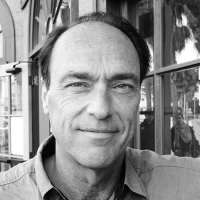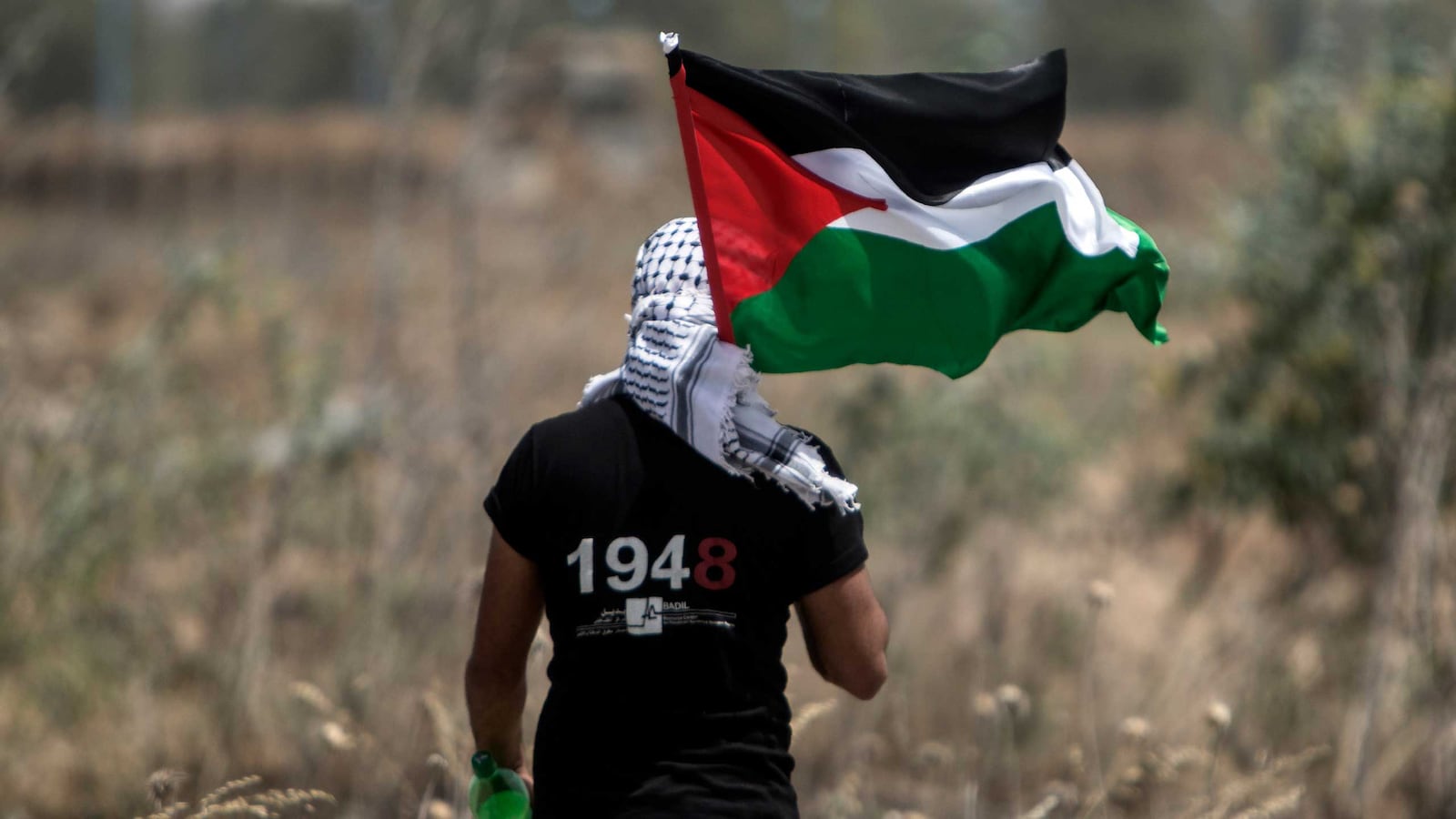GAZA CITY, Gaza—The indelible images of suffering and stories of loss are everywhere in Gaza. The family of nine in three small rooms whose only drinking water comes from plastic jugs filled at the mosque. The woman who lost 37 members of her family during Israeli strikes in 2014. The man who lived with 49 others in a relative's house after his neighborhood of Shujaiya was flattened.
But there is something else that abides in the day-to-day life in Gaza that for me resonates just as deeply: a kind of stubborn resilience in the face of catastrophe. An insistence on living a normal life, or at least trying to.
Recently I was walking along a spit of sand and rock that forms part of the Gaza harbor. The place was rippling with everyday life: fishermen pulling up their nets, laughing and giving each other grief; kids posing for selfies; families gathered under beach umbrellas at small plastic tables, sharing a modest picnic.
A young couple with their three kids invited Raed Athamnah, my guide and translator, and me to join them. The children nibbled from bags of chips, eyeing me shyly. Rana Dilly poured mango soda into small plastic cups while her husband, Ahmad, pushed an unopened package of chocolate wafers toward me. I politely declined; a big mistake. He laughed and pushed the package closer, telling me, "You are with Palestinians!" In other words, your resistance to our hospitality is futile!
Ahmad told me that despite the hardships and frequent dangers, he tries to come to this little finger of land nearly every day, just to clear his head and have some kind of normal feeling. He brings the family once or twice a week. “I want to share life,” he told me. “To share some things with my family and my kids. To show them something is possible.
“We just want to feel safe.”
I heard this phrase repeated again and again across Gaza—from refugee camps to the vegetable market; from offices, living rooms, restaurants and hotels; from the beach and the harbor.
Israel, of course, is the main actor in this narrative of fear and suffering of ordinary Gazans. In the 2014 war, Israeli rockets and bombs killed 500 children, destroyed 18,000 buildings and left 108,000 homeless. But just below the surface, in mostly veiled criticism, is frequent anger and frustration at Hamas for its provocations against Israel, through the crude rockets launched at Israel’s border towns, and the tunnel operations against Israeli soldiers.
“I blame all of them,” said Abu Osama, 75, a wizened shopkeeper in the Friday Gaza open-air market, sitting on a crate, wearing a white skull cap and sipping from a plastic cup of sweet Arabic tea. As we speak, his grandchildren gather around him. You blame all of them, including both Israel and Hamas, I ask? “All of them,” he repeats, invoking the common practice in repressive Arab societies: to criticize the authorities by including everyone in the blame. He also blames the Palestinian Authority, the U.S., and the international community he feels has abandoned Gaza. A pox, the old man is saying, on all their houses.
More than laying blame, though, the Gazans I talked to kept repeating their wish for some kid of normal life.
“I just want to feel safe,” said Abu Ali from his makeshift couch in an al fresco sitting room in the Gaza City neighborhood of Shujaiya. The wish is as simple as it is elusive for Abu Ali and nearly everyone else in Gaza. For Abu Ali and his family, living near the Israeli border turns that wish into a kind of mocking fantasy. As we spoke, an Israeli drone buzzed overhead—often a harbinger of another rocket attack. In 2014 Israel leveled a blocks-long section of Shujaiya with 7,000 shells in barely an hour. It was an attack so devastating that a retired American general declared, “Holy bejeezus!” He called the rate of fire “astonishing” and “absolutely disproportionate.”
During that war, “I got a call from the Israeli shabak [intelligence], saying, ‘You must leave this area,’” recalled Abu Ali, sitting in the filtered morning light beneath a lattice of grape leaves. Clucking chickens in his vegetable garden couldn’t quite drown out the sound of the drone. After the Israeli warning, Abu Ali started to move his family to his brother-in-law’s house, but as they left, he recalled, they came under shell fire from Israeli tanks. Eventually, they reached the relative’s house, where they lived for weeks, 50 people, he said, in two rooms.
Months after the 2014 war, Abu Ali finally returned to discover his home—the one he saved to build by working construction in Israel for 30 years—completely destroyed. Over the next year, with funds donated from Saudi Arabia, he rebuilt it, adorning his front entrance with repurposed leftover tank shells. He fears for the next attack. “I want to sleep well. I don’t feel relaxed here in my home. Nobody can stop the Israeli attacks. Who pays with their blood? The people.”
The level of death, crippling injury, lasting trauma, sudden homelessness and nonstop fear is difficult to comprehend, much less calculate, outside of a war zone like Gaza. The broader casualty numbers are well known, but what floors me on this trip is learning how much loss individual families endured. One Gazan, now in Ramallah, lost 37 members of her family in the 2014 war. Not a typo. Thirty-seven, including seven young men in a single bombing.
“They were not part of any militant organization,” said Tahani Abu Daqqa, former minister of culture for the Palestinian Authority; they were just young Palestinian men. Abu Daqqa tells me Israeli rockets also destroyed her Gaza home, even though, after Israeli warnings, it was empty and the neighborhood abandoned. As we spoke her phone kept lighting up and emitting little dings: updates on the evening’s killings from the ongoing Israeli attacks in Gaza, including a 14-year-old boy.
Stories of massive loss come simply for the asking. Raed, my guide, lost 18 members of his family, including brothers, uncles, and grandparents, in a 2006 attack, and 56 more were badly wounded. He’s had to rebuild his own home twice. “The important thing in my life is just to feel safe,” he tells me, repeating the Gaza mantra as we stand on a rise above the seashore. “That’s it. I don’t want to be a millionaire, I don’t want to be anything, just to feel safe, and have my kids safe.” A bullet, a bomb, a drone, a plane—from any of those, Raed tells me, “my life could change in minutes.” And so he feels always nervous. “When my wife calls me, I say, ‘what happened?’ Directly I want an answer. What’s going on? Because I don’t feel safe.”
“I just hope for everything to be calm,” he says, fixing his eyes on mine, imagining that day. “I stay with my family, we relax, we enjoy.” Perhaps a summer day on the beach below us, under an umbrella with some barbecue and minted lemonade. No fear, no tension, no terror when family members call him on his cellphone. “Safety life,” Raed tells me.
On the beach just below us, families are out in force. A few miles to the north and south, raw sewage pours into the ocean, because there's no electricity to run the sewage plant. Electrical power in Gaza runs for only four hours a day. But here, where it is not so badly polluted, kids run grinning and dripping out of the water. A horse-drawn cart plies the beach, laden with plastic floaties and sand toys.
"We have been through three wars now since 2008. We expect the next one could be this year or next year or after three years or next week," said Mohammed Halaby, who works for the Gaza City municipality, to try to procure essential items for Gaza in the face of Israel’s economic blockade. "So I would say everybody in Gaza wouldn't like be subject to pressure. They’re being resilient to the situation in general. We don't give up easily.”
Back at the Gaza harbor, an explosion echoes from across the water. Raed and the young parents, Ahmad and Rana Dilly, exchange looks. A pause; then Raed says, "A wedding!" On a Wednesday? I wondered. He assured me it was so. "People celebrate weddings every day!" They fish, they have picnics, they swim, they get married. Gazans, despite all the suffering they’re facing, are not on their knees.
As in Beirut in the 1980s and Sarajevo in the '90s, Palestinians in Gaza are passing their summer nights, despite the dangers, in the open—on their beaches, in their parks, on their fishing boats, their heads just above water.






